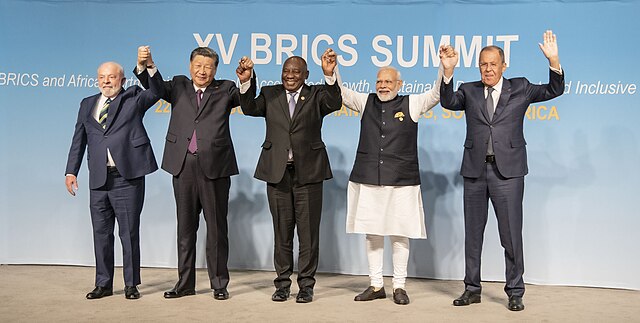 Leaders of BRICS countries at the 2023 BRICS Summit in South Africa by 15th BRICS SUMMIT
Leaders of BRICS countries at the 2023 BRICS Summit in South Africa by 15th BRICS SUMMIT
Assessing South Africa’s Complicated Relationship with China
In his first trip to Africa in over five years, General Secretary Xi Jinping pledged that China’s partnership with African countries would “enhance the voice of poor nations” and “shake off the yoke of colonialism.” These statements, while they may seem good-intentioned, are hypocritical. Through the coupling of South Africa’s economic, military, and political institutions with China’s, Xi and the Chinese Communist Party (CCP) are perpetuating the exact practices that they aim to depose.
China’s strategic relationship with South Africa began under the Zuma Administration and was enhanced through South Africa’s appointment to BRICS (formerly BRIC) in 2010. In 2019, Secretary General Xi pledged that China would take less risky development deals and invest in predictable, middle-income countries such as South Africa, and was the first African Country to join the Belt and Road Initiative. In 2022, South Africa imported $24.2 Billion worth of Chinese goods. In return, it received Chinese foreign direct investment amounting to $10 Billion from 2017-2022. President Ramaphosa and General Secretary Xi agreed to enhance cooperation and the comprehensive strategic partnership between the two countries at the 2022 G20 summit.
China is trapping South Africa into unsustainable debt plans, which may worsen the country’s already unstable economic situation. Because of increased imports, Pretoria has received favorable trade deals, making it a vital partner in terms of political influence in the region. Eight Chinese electricity companies have pledged to send equipment and expertise to help South Africa’s rolling blackout problem, which can leave citizens without power for up to six hours daily. This investment sees South Africa relying on Chinese technology to address a critical strategic infrastructure issue. If Pretoria needs more assistance, China may ask for more concessions, and Pretoria will be obligated to accept those terms. However, in South Africa, the CCP cannot be as outright predatory as it is in other African countries because it is a middle power instead of an emerging economy. The consequences of being too aggressive towards South Africa will come at a more significant cost regarding how the world perceives China. Therefore, they must bide their time and slowly integrate into the South African ecosystem to take advantage when the time comes.
The relationship between the two countries goes deeper than just their economic relationship. China has political goals in South Africa, such as aligning the African National Congress parties with its political views and supporting the South African Communist Party. In 2015, China started a party training program in South Africa that aims to educate African political leaders about China’s system of state-owned enterprises and one-party system. China also silenced defamation of the CCP in South Africa by canceling an article by a South African Journalist on human rights abuses in Xinjiang. If these activities continue, they could undermine democratic institutions in the country and prop up corrupt political leaders. South Africa is still a young democracy that only had their first democratic elections in 1994; thus, democratic values have not yet been able to take deep root in the country, and the institutions are still unstable. If China continues to meddle in the democratic institutions of South Africa now, the government could experience democratic backsliding.
South Africa has increasingly enmeshed its military with China’s in recent years. China’s joint military training with South Africa props up the country to be used as a military ally in a potential conflict with the United States over Taiwan. Considering China’s heavy investment in the country and their deepening strategic ties, Pretoria may find it difficult to say no to Beijing’s call for cooperation. This military cooperation also makes it less likely for South Africa to take a stand against its ally if the United States were to arbitrate conflicts with other disputed territories or come to Ukraine’s aid, given the Russia/China partnership.
The South Africa-China relationship, although relatively new, is starting to resemble a new type of colonialism. China continues to ingrain its economy with South Africa by increasing FDI into the country and creating unsustainable infrastructure deals. The CCP aims to align South Africa’s political system with its own to create less friction between the two countries in the future. Lastly, increasing military cooperation between the two countries creates a conflict of interest for South Africa in its relationship with the United States, potentially forcing South Africa to side with the Chinese if they need military assistance. South Africa should reassess its relationship with China to develop a national strategy free from China’s predatory practices.






